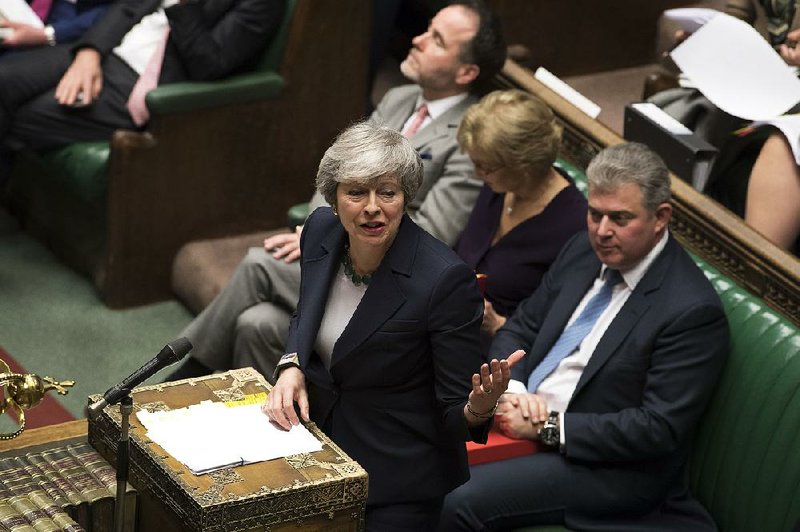LONDON -- British lawmakers voted Wednesday to block the country from leaving the European Union without a divorce agreement and will next decide whether to try to delay that departure, due to take place March 29.
That decision in Parliament, scheduled for today, was set up after a vote that represented yet another defeat for Prime Minister Theresa May amid months of political crisis over Britain's departure from the EU.
The lawmakers' 321-278 vote has political but not legal force, and it does not entirely rule out a chaotic no-deal departure for Britain. But it might ease jitters spreading across the EU after lawmakers on Tuesday resoundingly rejected May's divorce deal. Exiting the EU without a deal could mean major disruptions for businesses and people in the U.K. and the 27 remaining EU countries.
Speaking after weeks of relentless pressure, May said Parliament faced a "fundamental choice" -- a "short, technical extension" if lawmakers approve a divorce deal with the EU in the next week, or a much longer delay to Britain's withdrawal if they don't.
Delaying the exit would need EU approval. The bloc -- openly exasperated by Britain's continuing crisis -- warned that the U.K. would need to present a strong reason for any extension.
"I am against every extension -- whether an extension of one day, one week, even 24 hours -- if it's not based on a clear opinion of the House of Commons for something," said the European Parliament's chief exit official, Guy Verhofstadt. "Please make up your minds in London, because this uncertainty cannot continue."
The bloc is unwilling to consider a delay that goes beyond elections to the European Parliament in late May, as it would mean Britain would have to participate in the polls even as it prepares to leave.
U.K. lawmakers are trying to seize control from the divided and squabbling government, although it's far from clear whether they can agree on a way forward. There are competing factions that support May's deal, a "softer" deal that would keep close ties with the EU, a no-deal exit, or even a new referendum on Britain's EU membership.
Top EU officials warned that the prospect of a no-deal departure could not be eliminated unless the U.K. Parliament approved some type of exit agreement. By law, Britain will leave the EU on March 29, with or without a deal, unless it cancels its withdrawal or secures a delay from the EU.
"The risk of a no-deal has never been higher," chief EU negotiator Michel Barnier said.
"I urge you please not to underestimate the risk or its consequences," he told European lawmakers in Strasbourg, France.
Both Britain and the EU have ramped up planning for a no-deal exit, which would rip up decades of rules for travel and trade between Britain and the bloc. Economists say it could cause huge upheaval, with customs checks causing gridlock at U.K. ports, new tariffs triggering sudden price increases, and red tape for everyone.
The U.K. government announced its plans for the Irish border in the event of a no-deal exit, saying it wouldn't impose new checks, duties or controls on goods entering from EU member Ireland into Northern Ireland. It also said it wouldn't slap tariffs on 87 percent of goods going into Britain from the EU -- though there would be new levies on imports of some items, including meat and cars.
The tariffs, intended to be temporary, wouldn't apply to goods crossing from Ireland to Northern Ireland, raising fears that the plan would spark a rise in smuggling.
Irish Prime Minister Leo Varadkar said that under the proposals, "Northern Ireland will become a backdoor to the European single market, and I think that in a matter of months that will lead to the need for checks at Northern Ireland's ports."
"I don't think the U.K.'s proposals will be workable for very long," he said during a visit to Washington.
The European Parliament approved measures Wednesday to ameliorate the immediate hardships of a no-deal exit. It backed emergency plans to provide continuity for things such as air, port and road traffic; foreign students; and the fishing industry.
The U.K. Parliament has twice rejected the withdrawal agreement that May spent two years negotiating with the EU, and the bloc insists there will be no more talks.
German Foreign Minister Heiko Maas warned British lawmakers that "whoever rejects the agreement plays with the welfare of their citizens and the economy in a reckless way."
Yet May has not given up on a third attempt to get her deal through Parliament.
U.K. Treasury chief Philip Hammond said he was "confident that we will do a deal" in the next few weeks.
Information for this article was contributed by Renee Graham, Gregory Katz, Danica Kirka, Frank Jordans and Angela Charlton of The Associated Press.
A Section on 03/14/2019
